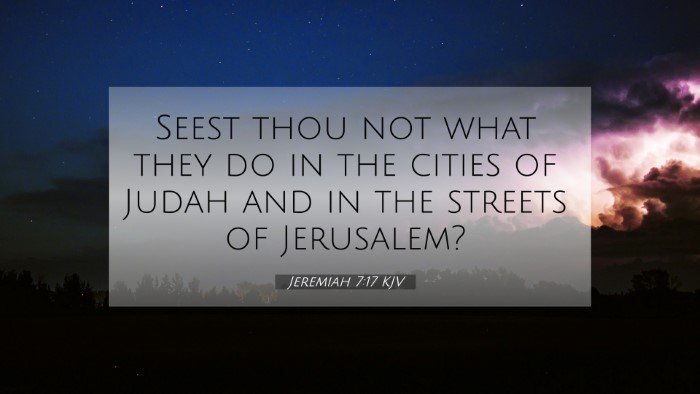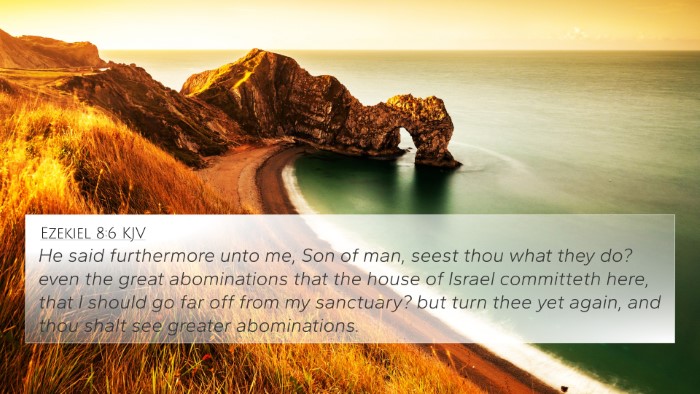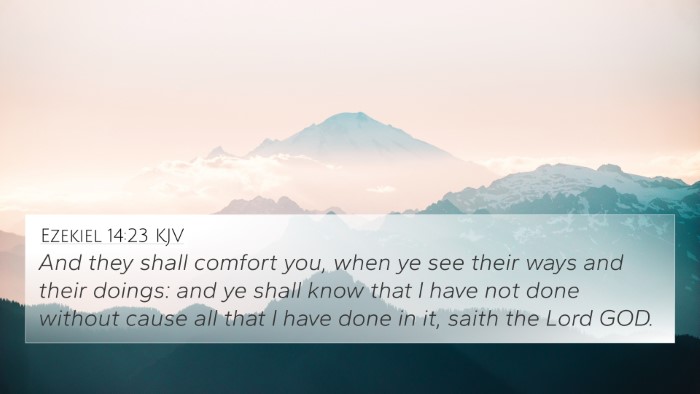Understanding Jeremiah 7:17
Bible Verse: Jeremiah 7:17 - “Seest thou not what they do in the cities of Judah and in the streets of Jerusalem?”
Summary of Jeremiah 7:17
This verse captures God's inquiry into the sinful actions of His people in Judah and Jerusalem. God, through the prophet Jeremiah, calls attention to the moral and spiritual decay prevalent in the cities, urging a realization of the severity of their transgressions.
Insights from Public Domain Commentaries
Matthew Henry's Commentary
Matthew Henry emphasizes that this question from God serves to highlight the ongoing disobedience of the Israelites. He notes that the lack of awareness among the people regarding their sinful behavior points to a deep spiritual blindness. Henry suggests that God’s observation calls for self-reflection among the people, encouraging them to recognize their need for repentance.
Albert Barnes' Notes on the Bible
Albert Barnes elaborates that the phrase “Seest thou not” indicates God's concern for humanity's moral state. He posits that this verse is a rhetorical question designed to provoke thought among the listeners. Barnes stresses that the ongoing practices in Judah and Jerusalem were contrary to God’s commandments, and the lack of acknowledgement of these acts shows a concerning disconnect from their covenant relationship with God.
Adam Clarke's Commentary
Adam Clarke underscores the prophetic nature of Jeremiah's message. He explains that the verse acts as a precursor to revealing the atrocities committed, including idolatry and social injustices. Clarke argues that God's query serves to invoke a sense of urgency over returning to righteousness. By stating what they are doing, it invites inquiry and reconsideration of their actions before divine judgment descends.
Thematic Connections in the Bible
This verse can be cross-referenced with the following Biblical texts which explore similar themes of moral awareness, judgment, and the need for repentance:
- Isaiah 1:3: "The ox knoweth his owner, and the ass his master's crib: but Israel doth not know, my people doth not consider."
- Hosea 4:6: "My people are destroyed for lack of knowledge: because thou hast rejected knowledge, I will also reject thee."
- Ezekiel 18:30: "Therefore I will judge you, O house of Israel, every one according to his ways, saith the Lord God. Repent, and turn yourselves from all your offenses."
- Lamentations 3:40: "Let us search and try our ways, and turn again to the Lord."
- Romans 2:5: "But after thy hardness and impenitent heart treasurest up unto thyself wrath against the day of wrath and revelation of the righteous judgment of God."
- Matthew 23:37: "O Jerusalem, Jerusalem, thou that killest the prophets, and stonest them which are sent unto thee, how oft would I have gathered thy children together, even as a hen gathereth her chickens under her wings, and ye would not!"
- James 1:22: "But be ye doers of the word, and not hearers only, deceiving your own selves."
Importance of Repentance and Self-Reflection
The call to recognize one’s actions serves as a critical reminder for believers today. Just as God implored the people of Judah to reflect on their ways, modern followers are equally encouraged to examine their lives and return to virtuous paths, fostering a relationship with God based on acknowledgment and repentance.
How to Use Cross-Referencing Tools
Utilizing tools for Bible cross-referencing can aid in deepening one’s understanding of scripture. Some effective methods include:
- Using a Bible concordance to locate related verses by key terms.
- Referring to a Bible cross-reference guide that highlights connections between verses.
- Employing cross-reference Bible study methods which facilitate thematic exploration of related passages.
- Engaging with Bible reference resources to uncover parallels within various Biblical texts.
Finding Cross-References for Jeremiah 7:17
To find cross-references for Jeremiah 7:17, one might consider the broader themes of divine warning and moral accountability. Questions to explore may include:
- What verses are related to the warning given in Jeremiah 7:17?
- How do these messages of accountability persist throughout both the Old and New Testaments?
- What connections exist between Jeremiah’s warnings and New Testament teachings on repentance?
Conclusion
Jeremiah 7:17 poignantly reminds us of the need for self-awareness in our spiritual walk. An understanding of this verse, bolstered by cross-references, can deepen one's faith and inspire a commitment toward righteousness. Reflecting on the scriptural admonitions can cultivate a more profound relationship with God, much like the intention behind Jeremiah's prophetic message.





